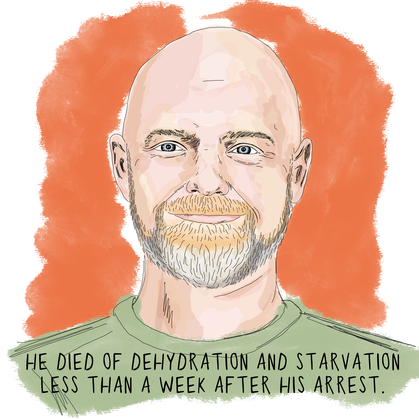
Lance Quick
- Age: 40
- Name of Jail: Bannock County Jail
- Location: Pocatello, ID
- Cause of Death*: Dehydration and starvation
- Incarceration Type: Pre-trial detention
- Private Company: Ivy Medical
- Incarceration Duration: Less than a week
- Date of Death: December 14, 2018
Lance Allen Quick, 40, was a former firefighter and paramedic who lived in Bannock County, ID. He had a history of mental illness and manic episodes. According to an investigation report from the Idaho attorney general, Quick was arrested and charged with a misdemeanor DUI on December 8, 2018. Quick insisted that he needed to go to a hospital to address his mental health issues, but police instead took him to Bannock County Jail, according to a legal filing by his family. His parents and a close friend repeatedly contacted the jail, explaining that he was experiencing a manic episode and trying to deliver his medications, but they were turned away, the legal filing alleged.
Quick soon “slipped further and further into psychosis” and stopped eating and drinking, according to the filing. By December 14, just six days into his incarceration, Quick was found dead in his cell. His autopsy report listed his cause of death as “Complications of Hypernatremic Dehydration and Ketoacidosis Secondary to Prolonged Period without Food or Water,” according to the state attorney general’s report.
Ivy Medical, the private company contracted to deliver healthcare in the jail, provided Quick with insufficient medical treatment or intervention “until they began resuscitation efforts after his death,” the filing alleged. “Even though Lance had certainly been irreversibly injured during withdrawal from antipsychotic medications in an empty cement cell, his death could still have been prevented even at this late stage by simply administering IV fluids,” according to the filing. Instead, “Lance died from completely preventable dehydration and starvation.”
Neither Ivy Medical nor Bannock County responded to the Lab’s requests for comment.
Kootenai County Prosecuting Attorney Barry McHugh, who was tasked with reviewing the Idaho attorney general's investigation and bringing criminal charges if appropriate, concluded that "the conduct of the Bannock County Sheriff's Office employees contributed in significant ways to the death of Mr. Quick." However, he declined to bring criminal charges, citing "insufficient evidence of criminal conduct."
"I also find that there is not proof beyond a reasonable doubt that anyone acted with reckless disregard of consequences," McHugh continued in a letter summarizing his conclusions. "Jailers offered food and water to Mr. Quick on a regular basis. They checked on him frequently, if not every 15 minutes as required. They attempted to have him evaluated medically, though they did not pursue an evaluation as his condition worsened."